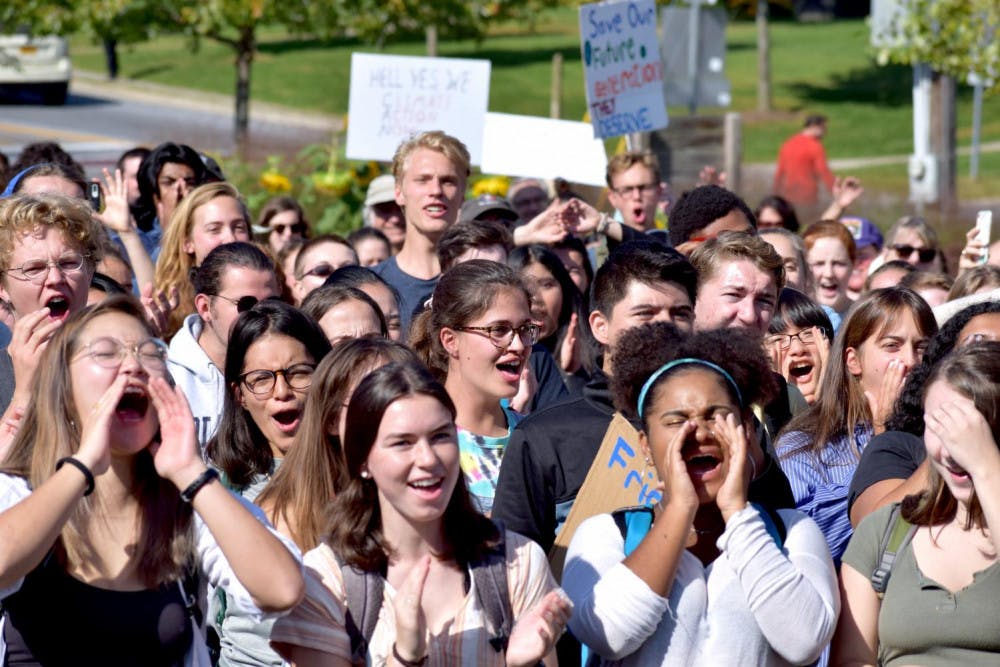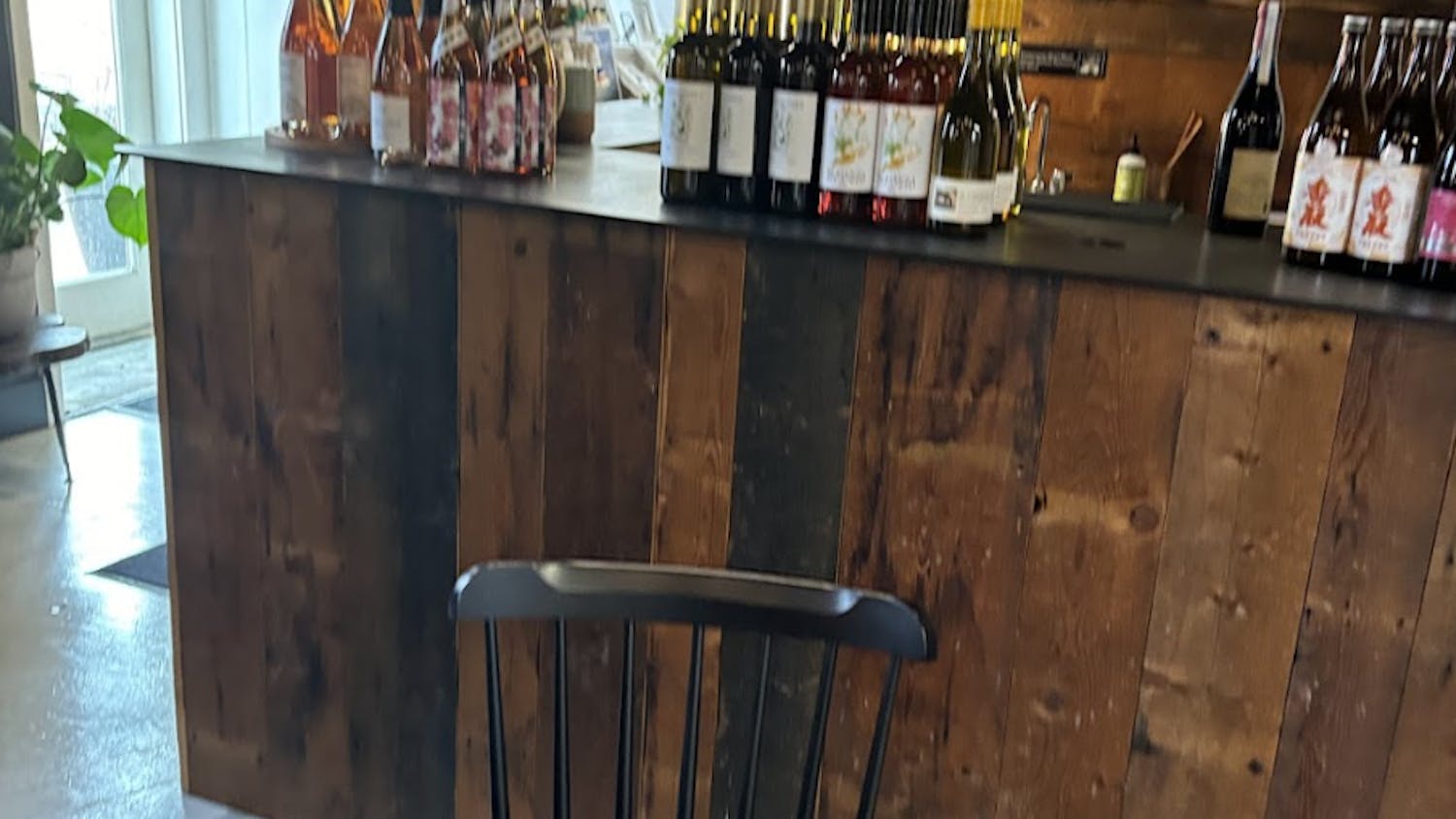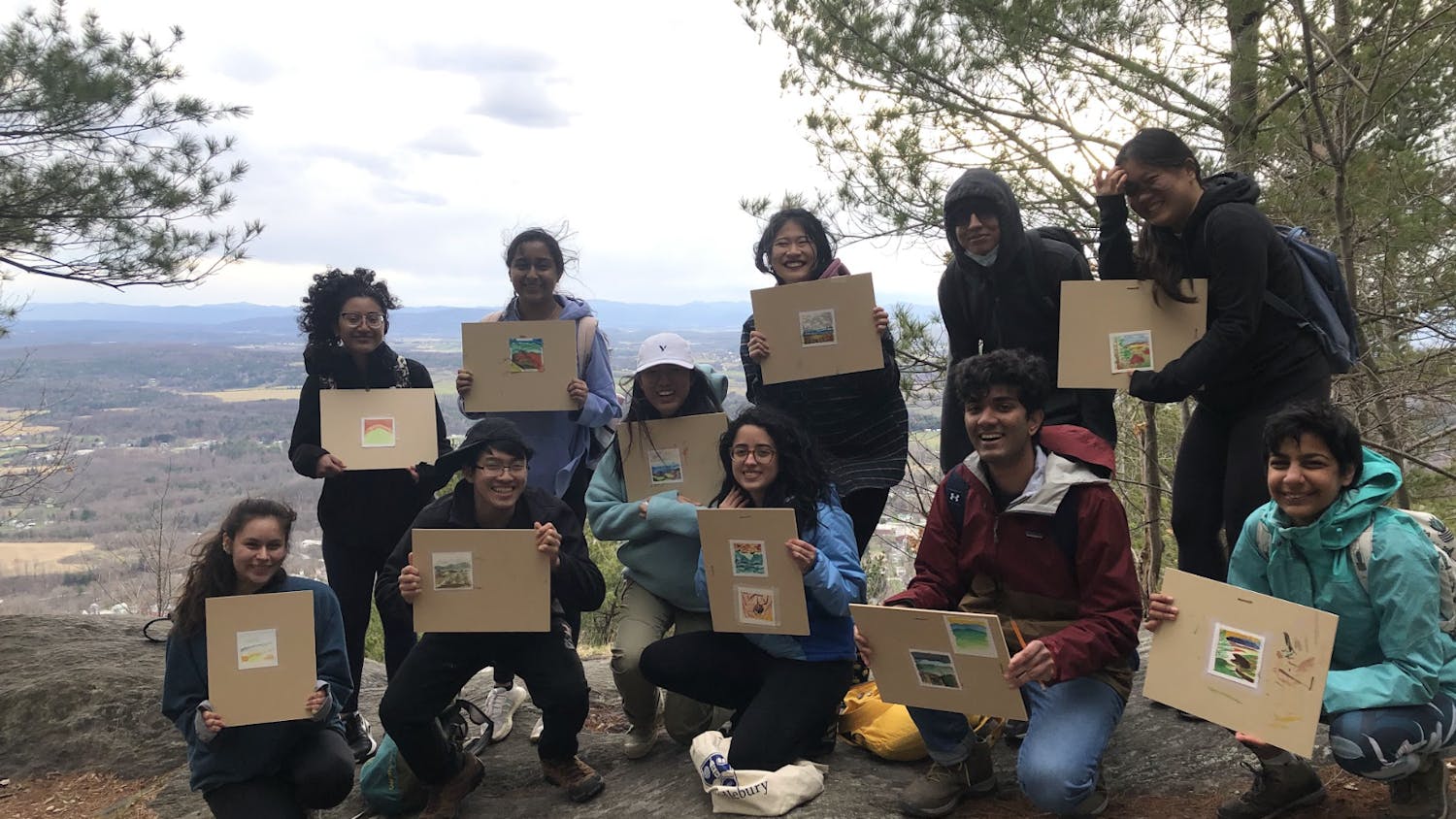Climate activists in over 150 countries left work, school and business as usual to join last Friday’s Global Climate Strike.
The first event in a planned week of worldwide climate activism, the Global Climate Strike arrived in Middlebury as hundreds of students, professors and town residents gathered at College Park to protest government apathy toward climate change. College students walked out of class at around 9:45 a.m. to attend the rally, joining students of all ages from the Addison Central School District as well as educators and community members.
Student organizations Divest Middlebury, Sunrise Middlebury, and Middlebury Sunday Night Environmental Group planned the strike in collaboration with Extinction Rebellion Vermont, a local climate activism group. Organizers Cora Kircher ’20, Zoe Grodsky ’20.5, Connor Wertz ’22 and Divya Gudur ’21 had been coordinating the event since July.
Attendees gradually collected around the speakers’ platform, and when most had arrived, strikers kicked off the event by chanting, “We are unstoppable. Another world is possible.”
“In my three years doing the climate strike, this is maybe the largest turnout we’ve had,” Grodsky told The Campus.
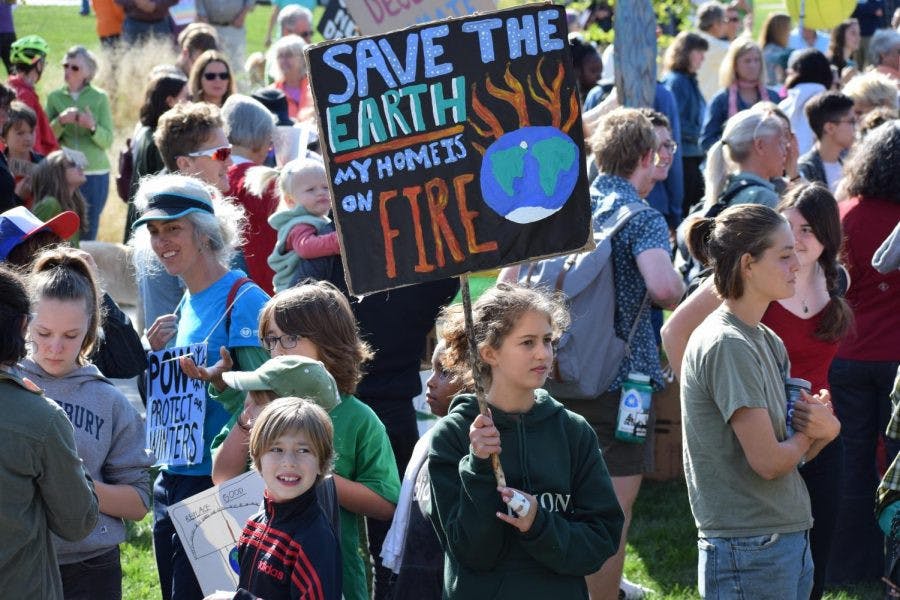
Some protestors held handmade signs that displayed phrases like: “Denial is not a policy,” “Go Greta [Thunberg!]” and “There is no Planet B.” College students hoisted a banner that stated “Strike 4 Climate.” The excited chattering and passionate dialogues about climate change subsided as a series of inspired speeches began. Families, friends and strangers alike stood side-by-side and listened intently.
Kircher spoke first, concentrating on the necessary coordination of the climate justice movement with “decolonization, racial justice and indigenous resistance.” As Middlebury is situated on what she referred to as “stolen land,” Kircher included a moment of silence in solidarity with the Abenaki — a native people of Vermont.
“We are here to demand an end to the age of fossil fuels, and we are here to demand something better,” Kircher said. “We’re striking because we believe that another world is possible, and we’re striking because that world is only as close as we make it and only as far away as we allow it to be.”
Grodsky spoke next, focusing on the uprising against oppressive institutions and the impossibility of true climate justice in a society where migrant, racial, and economic injustice are systemic and institutionalized.
“The climate change and the systems we talk about have material consequences on people’s lives—not in some far-off future, not in some far-off place, but right here, right now,” Grodsky said. “We must acknowledge that the disproportionate harm of climate change is falling right now on the most marginalized populations.”
During her speech, Grodsky also asked the crowd to join in remembrance of Juan de León Gutierrez, a 16-year-old Guatemalan migrant who, while fleeing the repercussions of climate change, was one of six children since September 2018 to die in United States custody.

Professor of Sociology and author of “Global Unions, Local Power” Jamie McCallum spoke after Grodsky, highlighting the power of protest to teach and to “win a better world.”
“There’s nothing I can think of that’s more ‘liberal arts’ than professors and students and community members being hauled off to jail together after such an action [as blockading the ICE Facility, or other acts of civil disobedience],” McCallum said at the rally.
McCallum also emphasized the ongoing alignment of the labor movement with the climate justice movement. He cited the United Auto Workers as an example of recent protest: On Sept. 20, they held a strike of 50,000 people against General Motors — a global corporation.
“We’re at a point where it’s pretty obvious that the climate crisis is an economic crisis, as well, and the people that have the power to transform an economic crisis, for the most part, are workers. Whether or not you work in an extractive industry, the climate crisis is beginning to affect all of us,” McCallum told The Campus. “There are all these ways in which these movements are cross-pollinating, and that is the holy grail of social change.”
Vivian Ross, a first-year at Middlebury Union High School, spoke fourth at the rally. She emphasized the onus on all community members — despite age, past activism (or lack thereof), or other obligations — to somehow actively engage in combating climate change.
“Walking out of school, leaving work, organizing a rally … These are actions that build and build into a barrier so high that the politicians and corporations can no longer scale it with their money and blatant lies,” Ross said. “As one human race, we are capable of making all the right decisions before the Earth as we know it dives off the cliff that it’s barreling toward. We are all perfectly capable of digging in our heels and refusing to let the worst of us get the better of us.”
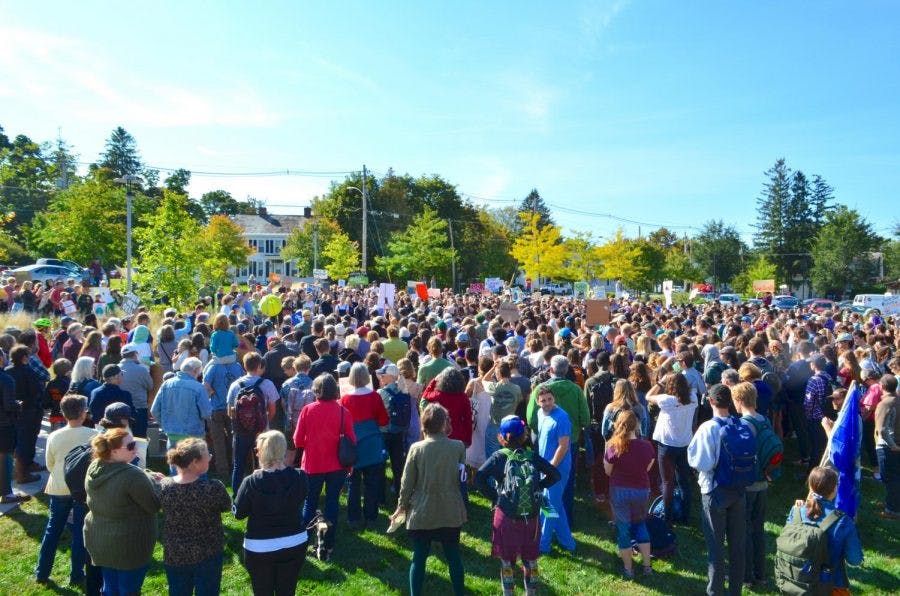
Environmental Studies Professor Rebecca Gould then taught the crowd a Hebrew song called “My Strength,” traditionally sung in peaceful protests — at “racial justice marches in D.C., in front of ICE facilities, after the Pittsburgh synagogue massacre, and in Jerusalem with women fighting for the right to pray at the Western Wall.”
“What music has done in social justice movements for hundreds of years, across cultures, is help us tap into the hope when we feel so much anger — not just righteous anger at the corporations but anger that gets in the way,” Gould said.
Professor Rebecca Gould teaches the crowd a song. #ClimateStrike pic.twitter.com/qlDQDte1cN
— Benjy Renton (@bhrenton) September 20, 2019
Student organizer Wertz spoke last, concluding the event by stating that “movements do not go home satisfied.” He then enumerated climate justice events occurring across Vermont and New England this week, including an upcoming demonstration in Bow, N.H. on Saturday, Sept. 28 against “the last large coal plant in New England.”
After a final song demanding climate justice, the crowd slowly dispersed as attendees enthusiastically conversed about the rally.
“I think the biggest obstacle in the fight against climate change is the power that corporations have over government funding,” Becca Brownstein ’23 told The Campus. Brownstein — together with about 30 students in her Natural Science and the Environment class — walked out that day.
Professor Spring Ulmer decided to hold her Advanced Nonfiction Writing Workshop in the park that day, allowing students to attend the rally without missing class.
“I felt that we could do both —workshop student writing, which I believe is a radical act — like Arundhati Roy says, ‘We have to fight back with our art’ — and attend the strike,” Ulmer told The Campus. “I agree with Nobel Prize nominee Greta Thunberg that strikes are educational and that there will be no reason to go to school, if there is to be — as a result of climate change — no viable future.”
Final song from Cora and Zoe. “People gonna rise like the water, we’re going to face this crisis now. I hear the voice of my great-granddaughter, saying climate justice now.” #ClimateStrike pic.twitter.com/yQE3xDo5z8
— Benjy Renton (@bhrenton) September 20, 2019
Climate strike worldwide: by the numbers


Becca Amen '22 is the Senior Local Editor.
She previously served as a Local editor, a staff writer and a copy editor.
Amen is a joint major in English and American Literatures and Philosophy.
During the summer of 2021, she interned at New England Review, where she recorded and produced an episode of their literary podcast. Her past stories include coverage on Ruth Hardy's run for Vermont State Senator and a report on the town of Middlebury's 2019 climate strike.
In addition to her work at The Campus, Amen hosts a radio show on WRMC, Middlebury's college radio, and serves as an editor for Middlebury's Blackbird art and literary journal.

